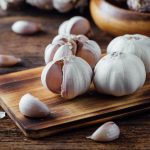Few ingredients span the range of international cuisines as much as garlic. Garlic has a rich and interesting history as both a flavoring and a medicinal food.
The bulb of a plant in the allium family (along with onions and chives), garlic contains potent antibacterial and antimicrobial properties, and is immensely flavorful while being extremely low in calories.
There are well over 30 varieties of garlic, from Elephant to Kettle River Giant and Transylvanian, all with a savory flavor. Though most recipes that call for garlic involve mincing raw cloves and adding as is to no-cook dishes or sauteeing it as part of a recipe, roasting garlic brings out its natural sweetness, reduces its pungency and turns each clove into a spreadable paste.
Roasted garlic is great for salad dressings and dips, because it won’t overpower the other ingredients and it blends in smoothly. For cooked dishes, simply replace raw garlic with the equivalent amount of roasted garlic and reduce cooking time accordingly. For a quick snack, squeeze the garlic from a roasted clove onto a cracker and spread it like butter.
Roasting one or more bulbs at once means you’ll have cooked garlic anytime you need it during the week ahead.
Roasted Garlic
- 1 or more garlic heads
- 1/4 teaspoon salt for each head
- 1 tablespoon extra-virgin olive oil for each head
Preheat your oven to 400 degrees. Line a baking tray with an 8-by-12-inch piece of parchment paper.
Cut the top off each garlic bulb and discard or use any bits for another recipe. Place the bulb(s) on the parchment. Sprinkle with salt and drizzle with oil. Fold the parchment paper over the top, then twist the ends of the paper and tuck them underneath to form a packet.
Roast 30 to 35 minutes until the garlic is soft to the touch and golden on top. Let cool and then use right away or store refrigerated in an air-tight container for up to five days.
More information
Learn more about garlic from the George Mateljan Foundation.
Source: HealthDay
Copyright © 2026 HealthDay. All rights reserved.
















